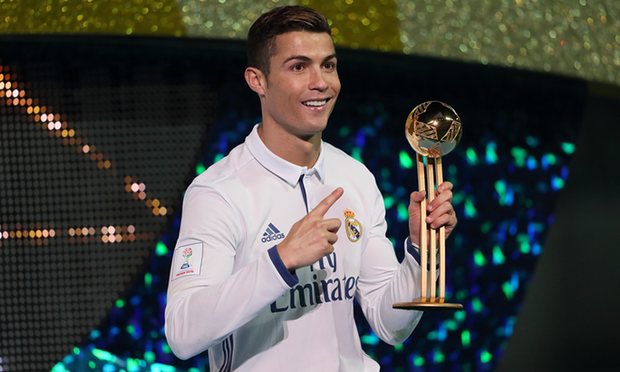Yes: it’s Him again. For the last few weeks it’s been hard to turn around without bumping into Cristiano Ronaldo, burnished and gleaming, immaculately tuxedoed, proudly fondling his latest gong. Well, here’s another one. As 2016 draws to a close the fifth edition of the Guardian’s annual top 100 footballers poll has a familiar chimney sweep at the top of its tree, with Ronaldo overtaking the reigning champ Lionel Messi to take the headline spot for the second time.
The No1 ranking reflects a year that saw Ronaldo collect winner’s medals from the Champions League and Euro 2016, while finishing as top scorer in the former and “Silver Boot laureate” – a second-placed prize for goals and assists combined – in the latter. Ronaldo scored 52 times in the calendar year. He was the headline player in two contrasting European champion teams: one steely underdogs; the other preening overdogs. Throughout he performed with undying efficiency in his favoured attacking areas, a marvel of the sporting age who turns 32 in two months’ time but remains an acme of preening, 12-packed athletic perfection.
All awards are, of course, a matter of opinion. The Guardian top 100 is at least a broad and impartial church. This year votes were drawn from an expanded panel of 124 judges based in 45 countries, from a diverse portfolio of eminent former professionals – including Javier Zanetti, Hernan Crespo and Faustino Asprilla – to a selection of football broadcasters and journalists from all across the globe. At the end of which Ronaldo beat Messi to top spot by a nose on the overall scoring system, with Antoine Griezmann a way back in third.
As ever polls like this raise questions about the role of the individual in what remains, for all the most energetic efforts of the marketeers, a team sport. The enduring beauty of football lies in the density of its patterns, the fine-point push and pull of team-play, the chemistry of tactics and systems.
Still though the eye is drawn to the headline acts. Predictably enough the top 11 are all attackers, with Luka Modric the first midfielder to appear at No12, and Diego Godín and Sergio Ramos the top ranked defenders at 24 and 25 respectively. Like Ronaldo, Pepe of Portugal and Real Madrid was also a major part of those Champions League and Euro-winning teams. Pepe was also in Uefa’s Euro 2016 team of the tournament. But here he slots in at No30 in our poll, just behind Mesut Özil.
For all that, there is a lot to be said for celebrating the inspiring effects of extreme individualism. Ronaldo managed to help win the Euros despite appearing at times to be having a very public nightmare of scuffed chances and endless close-up TV grimaces; and despite having a game-ending knee injury early in the final. For all his amusing egotistical quirks, this was a stirring, exemplary, relentlessly dogged pursuit of collective victory.
Just as impressive is the basic fact of finishing ahead of Messi, who remains not just the more imaginative and creative of the two, but arguably the greatest individual footballer of all time. Messi scored 59 goals in 61 games this year and did strange, stirring supernatural things with the ball on a regular basis. This is the guy who came second. Cristiano, hats off.
There are some notable trends further down the list. Players at Spanish clubs occupy the top six spots. Spain is also the most heavily represented nation for the fifth year in a row, ahead of France who surge up into joint second with Brazil. Ten Germans make the cut. Euro champs Portugal have seven players, up from just one (yes: Him) last year. England have four top 100-ers, one fewer than Belgium, one more than Uruguay. Wayne Rooney, the control in that 12-year Ronaldo experiment, drops out of the list for the first time. Rooney received two votes this year.
There is still a sense of turnover. Beyond the usual blur of A-listers Leicester’s outrageous spike of success has made an impact. N’Golo Kanté is the highest individual new entry at No16. Riyad Mahrez is 10th. One judge even voted Mahrez in at No1, not the worst call given the scale of achievement relative to his starting point. Similarly Jamie Vardy’s presence at No19, a decade on from combining football with working nights in a factory, is evidence of social mobility within the sport, even in an age of impossibly stratified riches.
That said it is probably a good moment to muse one last time on that extraordinary duopoly right at the top, replicated in our poll in every year to date. It is still hard to get any real perspective on this shared domination. When both are gone their wondrously sustained level of performance will perhaps become clearer. Even now, 12 years of professional football down the line, the ranking still reads: Ronaldo-Messi, fresh air, more fresh air, a vacuum, tumble-weed, elevator music, more fresh air, then the rest.
What happens next is unclear. Perhaps others will slip into that global champ role – Neymar, Gareth Bale – with similar annihilating success. One thing does seem certain. Whoever ends up replacing the current twin godhead is likely to have learnt their football in Europe or the Americas. This is the case with 98 of our top 100. With Pierre-Emerick Aubameyang and Mahrez both essentially footballing Europeans, Mohamed Salah and Sadio Mané were the only top 100 players to have learnt and played their youth level football outside the dominant club football continents. Unlike the ageing hegemony at the top, it is hard to see that changing any time soon.
The Guardian Sport
